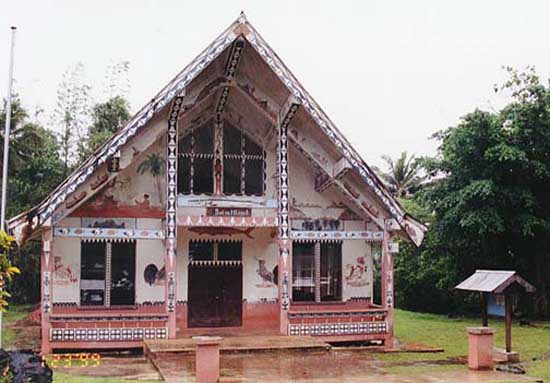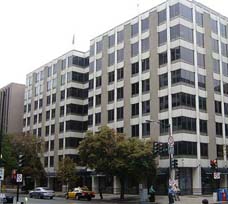2006.06.12: June 12, 2006: Headlines: COS - Palau: Daily Bruin: Tai Sunnanon spent two years as a Peace Corps volunteer in the Republic of Palau, an island of 17,000 located in the Pacific
Peace Corps Online:
Directory:
Palau:
January 23, 2005: Index: PCOL Exclusive: Palau :
2006.06.12: June 12, 2006: Headlines: COS - Palau: Daily Bruin: Tai Sunnanon spent two years as a Peace Corps volunteer in the Republic of Palau, an island of 17,000 located in the Pacific
Tai Sunnanon spent two years as a Peace Corps volunteer in the Republic of Palau, an island of 17,000 located in the Pacific

Sunnanon said he chose to volunteer in the Peace Corps out of a "genuine desire to help a developing country" and requested to serve in a small, rural village because it would be the most "grassroots" approach. In his village, there was no hot running water, few phones and electricity that went out on a regular basis.
Tai Sunnanon spent two years as a Peace Corps volunteer in the Republic of Palau, an island of 17,000 located in the Pacific
Peace Corps aids global, personal development
By Sara Taylor
DAILY BRUIN SENIOR STAFF
staylor@media.ucla.edu
On the first day of his diving trip to the Republic of Palau, Tai Sunnanon found himself face to face with a clam more than a meter in length.
"It was the one time I screamed like a girl," said Sunnanon, who graduated from UCLA in 2001 and spent two years as a Peace Corps volunteer in the Republic of Palau, an island of 17,000 located in the Pacific.
Earlier that day, Sunnanon had downed four bowls of stew, which he later found out was made of turtle intestines. As he ate, villagers crowded around him, cheering at the foreigner who was so open to a new culture, he said. Sunnanon described the experience as a rite of passage.
With this sudden initiation, Sunnanon entered the village community of 300 where he would spend the next 24 months as an educational volunteer, working on projects including bringing new textbooks to the local school and advocating for national education reform.
The Peace Corps, though an option relatively few graduates elect, is a post-graduation path some students from universities across the country choose to pursue.
Peace Corps volunteers spend three months in training in the region they have been assigned. Volunteers then spend two years in a developing country doing work such as improving health conditions, strengthening agricultural techniques and aiding in the growth of small businesses.
David Briery, a public affairs specialist for the Peace Corps, said about a third of those who apply actually end up volunteering; some drop out of the application pool because they realize the Peace Corps is not right for them while others are found ineligible based on outstanding criminal charges, unpaid debts or lack of experience.
Currently, 49 UCLA alumni are serving in the Peace Corps, and 1,626 have volunteered in the Peace Corps since the program started in 1961.
Sunnanon is one of those UCLA students who chose to join the Peace Corps – but though he said he gained invaluable experiences, he was quick to add the work is not for everyone.
Sunnanon said he chose to volunteer in the Peace Corps out of a "genuine desire to help a developing country" and requested to serve in a small, rural village because it would be the most "grassroots" approach. In his village, there was no hot running water, few phones and electricity that went out on a regular basis.
[Excerpt]
"There's an element of frustration. (In the U.S.), you're used to seeing the fruits of your labor," Sunnanon said. "In the Peace Corps, ... you see the fruits of your labor years after you leave."
Sunnanon said there were two times when he was ready to pack his bags and return home. He said he spoke to friends pursuing careers and attending graduate school in the U.S. and questioned whether the Peace Corps was the best use of his time.
But both times, Sunnanon ended up staying – quitting was not the route he would take.
Sunnanon was not alone in his inclination to return home as about 30 percent of volunteers who are sent abroad return before completing their two years, Briery said.
"A huge element is homesickness. Everyone will (be homesick) at some point," Sunnanon said.
Though Lee said she did not have much difficulty with homesickness, especially as she built relationships with people in her village, the isolation of the area could be hard for others.
She had no access to phones or e-mail in her village. She said she communicated primarily by snail mail, which she picked up at a nearby village. She accessed e-mail about once a month and hardly ever spoke on the phone.
But those who make it through the application process and stay for the full two years come home with experiences they would likely not otherwise have had, and say they return to the U.S. with a changed view of the world.
"We have this idea view here in the States ... that you need to do this or that," Lee said. "But then you see something else ... and things aren't (as) black and white as they used to be."
When this story was posted in August 2006, this was on the front page of PCOL:





Peace Corps Online The Independent News Forum serving Returned Peace Corps Volunteers
 | The Peace Corps is "fashionable" again
The LA Times says that "the Peace Corps is booming again and "It's hard to know exactly what's behind the resurgence." PCOL Comment: Since the founding of the Peace Corps 45 years ago, Americans have answered Kennedy's call: "Ask not what your country can do for you--ask what you can do for your country. My fellow citizens of the world: ask not what America will do for you, but what together we can do for the freedom of man." Over 182,000 have served. Another 200,000 have applied and been unable to serve because of lack of Congressional funding. The Peace Corps has never gone out of fashion. It's Congress that hasn't been keeping pace. |
 | Changing the Face of Hunger
In his new book, Former Congressman Tony Hall (RPCV Thailand) says humanitarian aid is the most potent weapon the United States can deploy against terrorism. An evangelical Christian, he is a big believer in faith-based organizations in the fight against hunger. Members of Congress have recently recommended that Hall be appointed special envoy to Sudan to focus on ending the genocide in Darfur. |
 | PC will not return to East Timor in 2006
Volunteers serving in East Timor have safely left the country as a result of the recent civil unrest and government instability. Latest: The Peace Corps has informed us that at this time, the Peace Corps has no plans to re-enter the country in 2006. The Peace Corps recently sent a letter offering eligible volunteers the opportunity to reinstate their service in another country. |
 | Chris Dodd considers run for the White House
Senator Chris Dodd plans to spend the next six to eight months raising money and reaching out to Democrats around the country to gauge his viability as a candidate. Just how far Dodd can go depends largely on his ability to reach Democrats looking for an alternative to Hillary Clinton. PCOL Comment: Dodd served as a Volunteer in the Dominican Republic and has been one of the strongest supporters of the Peace Corps in Congress. |
 | Vasquez testifies before Senate Committee
Director Vasquez testifies before the Senate Foreign Relations Committee on his nomination as the new Representative to the United Nations Agencies for Food and Agriculture replacing Tony Hall. He has been the third longest serving Peace Corps Director after Loret Ruppe Miller and Sargent Shriver. PCOL Comment: Read our thanks to Director Vasquez for his service to the Peace Corps. |
 | Interview with a Hit Man
RPCV John Perkins says that for many years he was an "economic hit man" in the world of international finance whose primary job was to convince less developed countries to accept multibillion dollar loans for infrastructure projects that left the recipient countries wallowing in debt and highly vulnerable to outside political and commercial interests. In this exclusive interview for "Peace Corps Online," Colombia RPCV Joanne Roll, author of Remember with Honor, talks to Perkins about his Peace Corps service, his relation with the NSA, "colonization" in Ecuador, the consequences of his work, why he decided to speak out, and what his hopes are for change. |
 | Peace Corps stonewalls on FOIA request
The Ashland Daily Tidings reports that Peace Corps has blocked their request for information on the Volkart case. "After the Tidings requested information pertaining to why Volkart was denied the position — on March 2 — the newspaper received a letter from the Peace Corps FOIA officer stating the requested information was protected under an exemption of the act." The Dayton Daily News had similar problems with FOIA requests for their award winning series on Volunteer Safety and Security. |
 | PCOL readership increases 100%
Monthly readership on "Peace Corps Online" has increased in the past twelve months to 350,000 visitors - over eleven thousand every day - a 100% increase since this time last year. Thanks again, RPCVs and Friends of the Peace Corps, for making PCOL your source of information for the Peace Corps community. And thanks for supporting the Peace Corps Library and History of the Peace Corps. Stay tuned, the best is yet to come. |
 | History of the Peace Corps
PCOL is proud to announce that Phase One of the "History of the Peace Corps" is now available online. This installment includes over 5,000 pages of primary source documents from the archives of the Peace Corps including every issue of "Peace Corps News," "Peace Corps Times," "Peace Corps Volunteer," "Action Update," and every annual report of the Peace Corps to Congress since 1961. "Ask Not" is an ongoing project. Read how you can help. |
 | RPCV admits to abuse while in Peace Corps
Timothy Ronald Obert has pleaded guilty to sexually abusing a minor in Costa Rica while serving there as a Peace Corps volunteer. "The Peace Corps has a zero tolerance policy for misconduct that violates the law or standards of conduct established by the Peace Corps," said Peace Corps Director Gaddi H. Vasquez. Could inadequate screening have been partly to blame? Mr. Obert's resume, which he had submitted to the Peace Corps in support of his application to become a Peace Corps Volunteer, showed that he had repeatedly sought and obtained positions working with underprivileged children. Read what RPCVs have to say about this case. |
 | Why blurring the lines puts PCVs in danger
When the National Call to Service legislation was amended to include Peace Corps in December of 2002, this country had not yet invaded Iraq and was not in prolonged military engagement in the Middle East, as it is now. Read the story of how one volunteer spent three years in captivity from 1976 to 1980 as the hostage of a insurrection group in Colombia in Joanne Marie Roll's op-ed on why this legislation may put soldier/PCVs in the same kind of danger. Latest: Read the ongoing dialog on the subject. |
Read the stories and leave your comments.

Some postings on Peace Corps Online are provided to the individual members of this group without permission of the copyright owner for the non-profit purposes of criticism, comment, education, scholarship, and research under the "Fair Use" provisions of U.S. Government copyright laws and they may not be distributed further without permission of the copyright owner. Peace Corps Online does not vouch for the accuracy of the content of the postings, which is the sole responsibility of the copyright holder.
Story Source: Daily Bruin
This story has been posted in the following forums: : Headlines; COS - Palau
PCOL33136
78


























